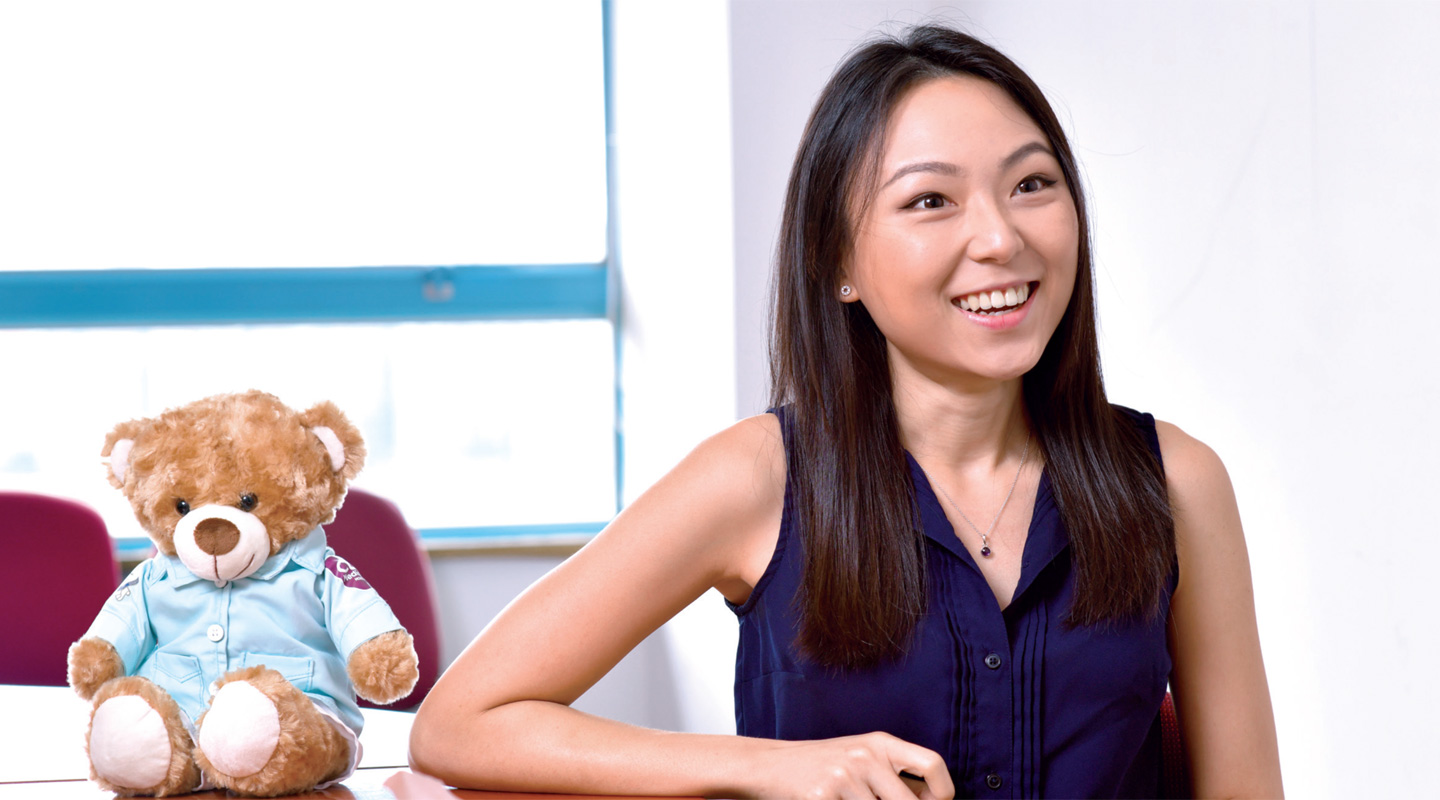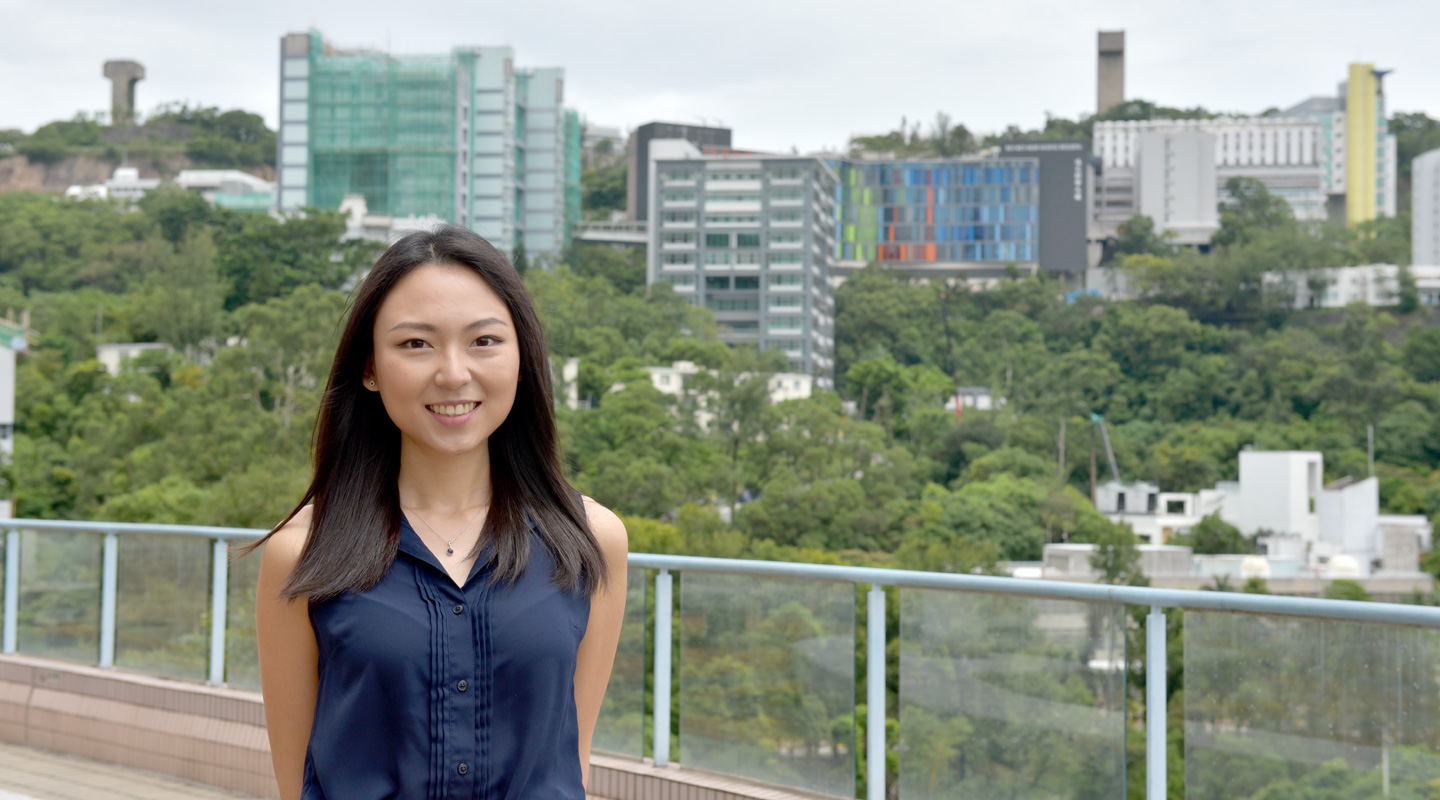Beyond Convention
Jocelyn Chew on nursing, research and passion

Nursing is said to be only for those strong enough to tolerate and soft enough to empathize. Jocelyn Chew epitomizes this without reservation. Atop her nursing acumen, the precocious PhD candidate—she’s just 26—embodies ambition, intellect, and cultural competency. Among her many qualities, ‘conventional’ is conspicuously absent. Jocelyn is only three years removed from finishing as one of the top nursing undergraduates in Singapore (National University of Singapore) and now stands on the cusp of completing her doctoral studies in CUHK’s Nethersole School of Nursing.
Along with the rest of campus, CUHK’s Esther Lee Building sits atop a mountain, making views from the eighth floor more impressive than eighth floors ordinarily allow. Rain drizzled from the grey sky and the stillness of the room echoed the glumness of the weather. Then, not a moment after 10:00 a.m., Jocelyn glided in. Her high-heels fell silent upon the carpeted floor, though she herself enlivened the conference room. Soft-spoken, cheery, and well-postured, her enthusiasm was immediately evident and remained throughout our conversation. The light accent with which she spoke hinted at her multilingual upbringing (her father and mother are from Malaysia and Hong Kong, respectively).
Before entering the National University of Singapore, Jocelyn had aspired to study business or medicine with her childhood friends. In Singapore, she explained, people look down on nursing and it isn’t considered on par with becoming a doctor. A false perception persists, framing nursing as a household cleaning and caretaking job.
‘I was preparing to take entry exams before university, and the night before my exam I fell ill. I was in the hospital at 3 a.m. and my test was at 8 a.m. I was panic-stricken. But a stranger came in and calmed me down—a nurse—and told me everything would be okay. Her empathy inspired me, and I ended up switching my degree path to nursing,’ explained Jocelyn. ‘I learned to see nurses as those responsible for walking patients through their journey of recovery, those responsible for compassion in the medical field.’
Business and medicine are two highly-touted, popular degrees in Singapore. When Jocelyn diverged into nursing, she lost most of her friends and academic supporters. ‘People didn’t think I made the right choice. I was abandoned by my community and I felt lost. I was lonely,’ she said, deadpan.
Throughout her undergraduate programme, Jocelyn worked various clinical placements, exposing her to patients in intimate settings. The geriatric patients, said Jocelyn, were often isolated and depressed, leaving it to her to bring companionship and comfort into their lives. Her ability to reinvigorate life into her patients inspired her, burgeoning her ambition to new heights. Jocelyn’s patient interactions revealed to her the salience of the nursing field.
‘I wanted to do more. I wanted to help diagnose patients, advocate evidence-based practices, research treatment plans—I began to feel that I wanted to do something beyond clinical care. My desire to make an impact and help others motivated me to study diligently for postgraduate school.’
Despite being sought after for clinical positions following her Bachelor’s degree, Jocelyn opted to directly enrol in CUHK’s PhD programme, circumventing the traditional route of field work, a Master’s degree, more field work, and then a PhD programme. ‘My nursing friends had wanted to work clinicals together after graduating. Other than my professors, who encouraged me a great deal, I had little support when I chose the PhD and research path,’ explained Jocelyn, a touch wistfully. ‘My community fell away from me once again. It was a really difficult time.’
Jocelyn arrived at Hong Kong armed with resilience, an unwavering work ethic, and the indelible confidence that accompanies her as one of Singapore’s top scoring university students. She entered the four-year PhD programme with the intention to finish in just over three. As she had done previously, Jocelyn persevered despite the dearth of support. Her passion for research and teaching bloomed in Hong Kong, where she taught undergraduate courses and involved herself in a broad range of research topics, from artificial intelligence to palliative care to metabolic syndrome. She credits CUHK’s faculty for their professional mentorship and guidance.
This past year, Jocelyn’s efforts were recognized when she won an award under the Global Scholarship Programme for Research Excellence to undertake a six-month research attachment at the National University of Singapore. Today, Jocelyn is preparing to defend her PhD thesis before a doctoral committee in the coming months. She remains on track to complete her studies early, another feather in her cap of non-conformity.
‘My research centres on improving self-care in heart failure patients using the temporal self-regulatory theory. I explore patients’ perspective on time, and try to evoke their motivations by asking them how their short- and long-term health impacts their future. Lifestyle changes, habits, tendencies—things that are often overlooked in medicine—form the crux of sustainable health care.’
In the coming years, Jocelyn hopes to translate her research into practice. Clinics or government medical bodies could provide her the platform to implement frontline nursing care based on her PhD research. Though she currently studies heart failure patients, self-care procedures can be enacted across a multitude of diseases, making widespread implementation viable.

Outside, the sun was peeking through the clouds. Daylight glistened off the university buildings below like a glass watch face before a television screen. The room brightened as if on cue with the climax of Jocelyn’s success story.
‘It is so important to follow your own path, regardless of what others are saying around you. If you know what you want to do—what you have to do—go forward and do it. I left everything and everyone behind in Singapore to pursue my path. It seems cliché, even frivolous, but following my passion rather than convention was absolutely the right choice.’
Phil Rosen
This article was originally published in No. 543, Newsletter in Sep 2019.

